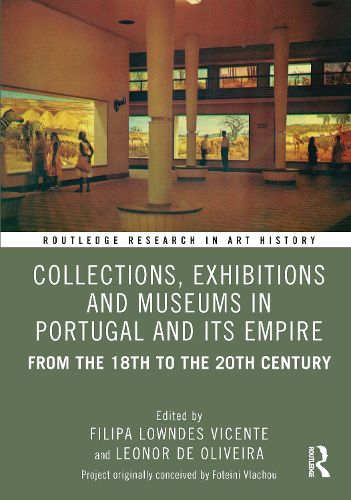Readings Newsletter
Become a Readings Member to make your shopping experience even easier.
Sign in or sign up for free!
You’re not far away from qualifying for FREE standard shipping within Australia
You’ve qualified for FREE standard shipping within Australia
The cart is loading…






Focusing on the period between the beginning of the eighteenth century and the late twentieth century, this edited volume examines the histories of objects, museums, exhibitions, and collections in Portugal or outside Portugal but representing Portugal, or related to it through colonial relationships.
The book highlights the specificities of the Portuguese case, set against a globalised, transnational, and transcolonial context, and provides a precedent for future studies and a dialogue with equivalent studies related to other geographies. The diversity of the cultural, intellectual, and political contexts (imperial, colonial, monarchical, republican, authoritarian) offered by the Portuguese example allows for the exploration of a number of complex case-studies. Chapters study the artistic, collecting, and museological practices in Portugal and in the various geographical contexts of its colonial empire, with particular emphasis on the circulation and connectedness of objects, products, people, and ideas.
The book will be of interest to scholars working in art history, museum studies, intellectual and cultural history, and imperial and colonial history.
$9.00 standard shipping within Australia
FREE standard shipping within Australia for orders over $100.00
Express & International shipping calculated at checkout
Focusing on the period between the beginning of the eighteenth century and the late twentieth century, this edited volume examines the histories of objects, museums, exhibitions, and collections in Portugal or outside Portugal but representing Portugal, or related to it through colonial relationships.
The book highlights the specificities of the Portuguese case, set against a globalised, transnational, and transcolonial context, and provides a precedent for future studies and a dialogue with equivalent studies related to other geographies. The diversity of the cultural, intellectual, and political contexts (imperial, colonial, monarchical, republican, authoritarian) offered by the Portuguese example allows for the exploration of a number of complex case-studies. Chapters study the artistic, collecting, and museological practices in Portugal and in the various geographical contexts of its colonial empire, with particular emphasis on the circulation and connectedness of objects, products, people, and ideas.
The book will be of interest to scholars working in art history, museum studies, intellectual and cultural history, and imperial and colonial history.